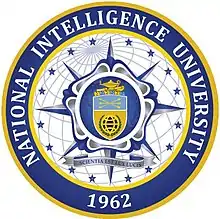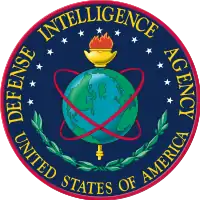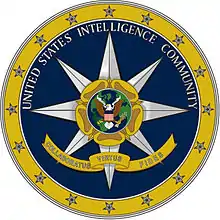National Intelligence University
The National Intelligence University (NIU), formerly known as the National Defense Intelligence College and the Joint Military Intelligence College, is a federally chartered research university in Bethesda, Maryland. NIU is the United States Intelligence Community's (IC) institution for higher learning in fields of study central to the profession of intelligence and national security. NIU awards undergraduate and graduate degrees, graduate certificates, and prestigious research fellowships to prepare personnel for senior positions in the IC and the broader national security enterprise. Since 1963, more than 80,000 military and civilian students have attended the university.[1] Formerly located at the Defense Intelligence Agency headquarters in Washington, D.C., NIU's primary campus is now located at Intelligence Community Campus-Bethesda (ICC-B) with four additional locations around the world.
 | |
Former names | National Defense Intelligence College (NDIC), Joint Military Intelligence College (JMIC), Post-Graduate Intelligence Program (PGIP) |
|---|---|
| Established | 1962 |
Parent institution | Defense Intelligence Agency |
| Chairperson | John Gannon |
| President | J. Scott Cameron |
| Provost | Terrence Markin |
| Dean | James Marchio, Acting Dean, College of Strategic Intelligence |
| Dean | Brian Holmes, PhD, Dean, Anthony G. Oettinger School of Science and Technology Intelligence |
Academic staff | 80+ |
| Students | ~600 |
| Location | , , United States |
| Campus | 6 |
| Website | www |
National Intelligence University's interdisciplinary programs emphasize education through scholarly and applied research designed to help U.S. intelligence officers better understand the diverse range of geopolitical, strategic, and technological threats and opportunities affecting intelligence and national security. The university is organized into two separate academic units: the College of Strategic Intelligence and the Anthony G. Oettinger School of Science and Technology Intelligence. Combined, the colleges cover a diverse and evolving range of international affairs issues and adversarial threats and capabilities, from cultural and religious conflicts to WMD proliferation, cybersecurity threats, terrorism, transnational crime, and more.[2]
Congressionally chartered and publicly funded but with admissions restricted solely to current U.S. Intelligence officers holding a Top Secret/Sensitive Compartmented Information clearance, NIU is a small, non-resident university. Admissions are highly selective, but tuition is paid by the United States Government.
History
The United States Department of Defense established the Defense Intelligence School in 1962 to consolidate existing U.S. Army and Navy academic programs in strategic intelligence. In 1980, the U.S. Congress authorized the school to award the Master of Science of Strategic Intelligence degree. In 1981, the Commission on Higher Education of the Middle States Association of Colleges and Schools accredited the School. That same year, DoD rechartered the institution as the Defense Intelligence College, placing additional emphasis on its research mission.
Since then, the university has added several off-campus programs at the National Security Agency and several regional centers and has encouraged an increase in enrollment from civilian agencies. On campus, it has also added two part-time graduate programs, one designed for military reservists. Students from throughout the Intelligence Community attend the university, and they include active duty and reserve military personnel from each of the services (including the Coast Guard), DoD, and other federal civilian employees.
Renamed the Joint Military Intelligence College in 1993, it educates the future leaders of the Intelligence Community by offering an undergraduate and graduate curriculum. In addition, the university sponsors research and publication opportunities for students and faculty, attracts distinguished speakers, and its students participate in field exercises and simulations in partnership with their peers at the military staff and war colleges.
Vision and mission
NIU is an accredited federal degree granting institution educating and preparing intelligence officers to meet current and future challenges to the national security of the United States. Former NIU President Dr. David Ellison stressed in his 2012 graduation remarks that NIU addresses these challenges by helping students develop "depth in critical thinking" and "breadth in understanding the IC" and how focused research applies to analysis and addressing critical questions on national security.[1]
Educational accreditation
The university is authorized by the United States Congress to award the Bachelor of Science in Intelligence, the Master of Science and Technology Intelligence and the Master of Science of Strategic Intelligence degrees. The university is accredited by the Commission on Higher Education of the Middle States Association of Colleges and Schools.
Facilities and resources
The NIU Library houses 2.5 million items, including books, unclassified intelligence documents, reference materials, periodicals, microfilms, video and cartographic items. The library subscribes to 2,000 international periodicals, newspapers, annuals, serials, and statistical reports. It is particularly strong in Russian periodicals. The library has archival microfiche and microfilm collections of general and scholarly periodicals, Foreign Broadcast Information Service reports, and declassified documents. The NIU Library is located at ICC-B.
The Office of Research within the university enables students to pursue projects that require research outside the Washington, DC, area, including overseas. The university encourages faculty research on intelligence issues and supports intelligence-related research by faculty from other DoD Schools. Faculty and student research is published in academic journals, in the university's Occasional Paper series, and in book-length special studies. Research results and thesis abstracts are also disseminated electronically to the Intelligence Community.
Academic programs
- Bachelor of Science in Intelligence (BSI)
- Master of Science of Strategic Intelligence (MSSI)
- Master of Science and Technology Intelligence (MSTI)
- Certificates of Intelligence Studies (CIS)
Admissions
All prospective NIU students must meet the following requirements:
- Be U.S. citizens who are members of the U.S. Armed Forces or are federal government employees
- Be nominated by their parent organization (full-time students), and
- Possess a TS/SCI security clearance prior to enrollment
Notable Graduates and Faculty
See also
References
- "National Intelligence University 2017–2018 Catalog" (PDF). NIU. Aug 2017. Retrieved 18 Sep 2017.
External links
| Wikimedia Commons has media related to National Intelligence University. |

